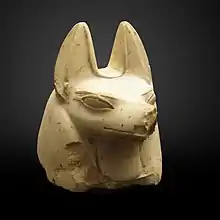Duamutef
Duamutef was, in ancient Egyptian religion, one of the four sons of Horus[1] and a protection god of the canopic jars.[2] Commonly he is said to be the son of the god Horus the Elder. Another myth describes Duamutef and his brothers as sons of Osiris. According to this account, they were born from a lily flower which arose from the primaeval ocean.
| |||||||||
| Duamutef in hieroglyphs |
|---|
| Part of a series on |
| Ancient Egyptian religion |
|---|
 |
|
|
Etymology
The name Duamutef means "He who adores his mother". In war, the most frequent cause of death was from injuries in the torso and stomach. The deity protecting this organ was associated with death by war and gained the name Duamutef, meaning "adoring his motherland".[3]
Portrayal

Duamutef was originally represented as a man wrapped in mummy bandages. From the New Kingdom onwards, he is shown with the head of a jackal.[4] In some cases his appearance is confused or exchanged with that of his falcon-headed brother Qebehsenuef, so he has the head of a falcon and Qebehsenuef has the head of a jackal.
Duamutef usually was depicted on coffins and as the lid of canopic jars. Many images of the Judgement of the Dead show him together with his brothers in front of Osiris on a small lily flower.
As protective god of canopic jars
Alongside with Horus' three other sons Imsety, Hapi and Qebehsenuef, Duamutef protected the mummified internal organs. His goal was to protect the stomach.[5] His protector is the goddess Neith.[6]
References
- The four Sons of Horus, Duamutef also Tuamutef
- "Duamutef(Tuamutef, Golden Dawn, Thmoomathph)". Egyptianmyths.net. Retrieved 2012-08-30.
- https://www.aldokkan.com/religion/hapy.htm
- Duamutef (Tuamutef, Golden Dawn, Thmoomathph)
- Duamutef. (see: Four sons of Horus), Four sons of Horus. Archived June 27, 2012, at the Wayback Machine
- "Duamutef: Alternate name[s]: Tuamutef; Golden Dawn, Thmoomathph". Archived from the original on November 21, 2012. Retrieved September 7, 2012.